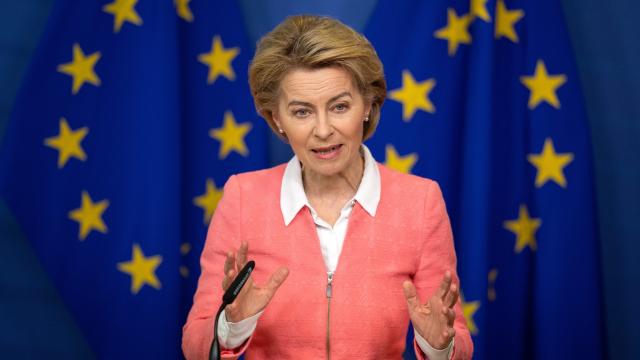The European Commission’s released its long-awaited climate law proposal in Brussels on Wednesday. It would commit the 27 nations in the EU to become carbon neutral by 2050. To pass, the law needs the approval of the European Parliament and the EU’s 27 member states. But it’s got some pretty serious shortcomings.
“The Climate Law is the legal translation of our political commitment, and sets us irreversibly on the path to a more sustainable future,” said European Commission President Ursula von der Leyen in a statement.
The law would allow officials to raise the ambition of greenhouse gas emissions targets every five years from 2030 onwards and take any governments that refuse to comply to European Court of Justice, where they could face fines. And actions to raise ambitions would begin in September; the law says, the European Commission would raise the EU’s emission reduction target for 2030 from 40 per cent, to 55 or 55 per cent.
While that may sound soon, a dozen member states, including Denmark, Spain and Italy, have called on the EU to come up with a more ambitious 2030 goal even quicker. The countries argued that September is far too late, because under the Paris Climate Accord, governments must submit their updated 2030 climate plans before November’s international climate talks in Glasgow.
“Two months before the climate conference is really late, it doesn’t give countries much time to come to an agreement on these goals” Sebastian Mang, climate policy adviser to Greenpeace EU, told Earther. “And 50 or 55 per cent isn’t really in keeping with the Paris Agreement anyway. It’s not in line with the goal of two degrees [Celsius or 3.6 degrees Fahrenheit] of warming.”
In a November report, United Nations scientists warned that to keep temperature increases below 1.5 degrees Celsius (2.7 degrees Fahrenheit) and adhere to the Paris Agreement, countries must reduce global emissions by 7.6 per cent each year until 2030.
“We’ve used that data to calculate what the EU would have to do based on that 7.6 per cent figure, and it would be a 65 to 68 per cent reduction by 2030,” said Mang. “And that doesn’t include equity. Europe is relatively wealthy compared to other parts of the world, and if you take that into account, you would actually have to do way more than that to be fair.”
The law also doesn’t mandate that the oil and gas industry needs to wind down. Instead, it calls for countries to reach carbon neutrality, meaning “greenhouse gas emissions should be reduced to a minimum while offsetting the remaining emissions” by reforesting land or investing in carbon capture and storage technology.
But carbon capture technology has not been shown to work at scale, and reforestation offsetting programs have been problematic in the past. A World Bank and United Nations carbon offsetting program, for instance, was complicit in land grabs in Kenya and Brazil where governments forced thousands indigenous people from their ancestral homes—and didn’t even reduce emissions much. A 2016 report commissioned by the European Commission that 85 per cent of carbon offset programs analysed overestimated their reduction benefits at best and failed to reduce emissions at all at worst.
The far better solution is to quickly phase out extracting and producing fossil fuels altogether, but the EU is doing the opposite. A recent report found that European countries are currently planning to invest almost $US130 ($197) billion into new gas-fired power plants, liquefied natural gas import terminals, and gas pipelines.
The law also doesn’t include plans to end the EU’s subsidies for polluting industries. “We’re demanding the climate law phases out all subsidies the fossil fuel industry and industrial agriculture,” said Mang. “That would really have a big impact.”
In an open letter published in Carbon Brief, 34 youth climate activists, including Greta Thunberg said that the climate law in its current form “will do more harm than good.
“We will not be satisfied with anything less than a science-based pathway which gives us the best possible chance to safeguard the future living conditions for humanity and life on earth as we know it” they wrote. “Anything else is surrender. This climate law is surrender – because nature doesn’t bargain and you cannot make ‘deals’ with physics. And we will not allow you to surrender on our future.”
